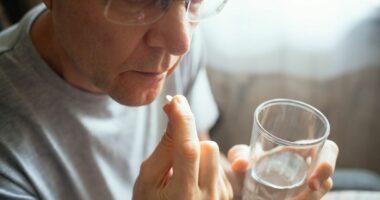Share this @internewscast.com
Heart disease is the leading cause of death worldwide, claiming 20 million lives annually. Recently, researchers have suggested that a common bacterium found in the mouth and gut may significantly impact heart health.
Researchers in Finland analyzed samples of fatty deposits called plaque that build up in the arteries and reduce blood flow to the heart.
The samples were taken from over 100 people who died of a heart attack and another 100 who had surgery to have plaque cleared from their arteries.
The scientists investigated the plaques for harmful bacteria and discovered the DNA of a common bacterium, Viridians streptococcal, present in over 40 percent of plaque samples from both groups. This bacterium resides in the mouth and digestive tract.
Naturally found in the mouths of most Americans, Viridians streptococcal bacteria is usually harmless in healthy people.
Among the participants, the bacteria often existed as a biofilm, a cluster of organisms embedded in the arterial walls, lying dormant and escaping the immune system’s detection.
However, in individuals who are immunocompromised or suffer from chronic illnesses, these organisms can break free from the biofilm, potentially causing endocarditis—an infection of the heart’s inner lining resulting in inflammation, heart tissue damage, and blockages.
If infected tissue detaches from a heart valve, it can travel through the bloodstream and become lodged in the coronary artery, obstructing blood flow and ultimately leading to a heart attack.
In light of these findings, experts are advising people to practice good oral hygiene, such as brushing and flossing twice daily and keeping up with dental check-ups, to decrease the amount of Viridians streptococcal in the mouth.

Researchers in Finland found a common bacteria found in the mouth could be linked to America’s biggest killer, heart disease (stock image)
Dr Pekka J Karhunen, study author and professor in the Faculty of Medicine and Health Technology at Tampere University in Finland, told Medical News Today: ‘We aim to show that there is a biofilm consisting of many bacteria in the atherosclerotic plaques and we also study the possibility that calcification of the biofilm — which occurs in the surface of the teeth — might also be involved in the calcification of coronary arteries.’
The findings come as nearly one in three Americans, 83million, have some form of cardiovascular disease, including coronary artery disease, heart failure, heart attack and stroke.
Health authorities expect by 2050, more than 60 percent of Americans will have some form of heart disease.
Cardiovascular disease accounts for one in three – 1million – deaths in the US, making it the leading cause of death.
The new study, published last month in the Journal of the American Heart Association, looked at coronary plaque samples from 121 people who suffered a sudden cardiac death.
The average participant age was 63, and nearly three in four were men.
Participants in this group also had an average body mass index (BMI) of 30, indicating obesity, one of the leading causes of heart disease.
The team also looked at an additional 96 people who had undergone an endarterectomy, a surgery to remove plaque from the inner lining of an artery.
The average participant age in this group was 69, and 72 percent were men. Their average BMI was 27, indicating they were overweight but not obese.

Southern states are more at risk of high death rates from heart disease, the latest data from the CDC shows
The team found 66 percent of plaque samples from the deceased group contained bacteria and 58 percent from the surgery group had it.
However, the most common bacteria in both groups was oral viridans group streptococci (Viridians streptococcal). It was found in 42 percent of deceased patients and 43 percent of those who had surgery.
In normal, unclogged arteries, there was less bacteria.
Dr Karhunen said: ‘Oral viridans group Streptococci are known to act as early colonizers in the buildup of the dental biofilm known as dental plaque.
‘This signals that the streptococci may not be there alone – it is possible that there is a biofilm composed of many bacteria.’
He noted that while in the biofilm, bacteria ‘are safe inside the jelly-like cover and they do not cause any harm to the individual.’
However, he said the ‘situation changes dramatically’ when the biofilm is activated through an infection or other cause, resulting in the bacteria spreading to the plaque and causing inflammation and blood clots.

Chloe Burke went into cardiac arrest at 21 years old while cheering at the University of Houston due to an undiagnosed congenital heart defect

Matias Escobar, pictured here in the middle, nearly died while competing in the New York City Triathlon in 2023 at age 38
The bacteria may then lead to endocarditis, an infection in the inner lining of the heart and its valves, which strikes between 10,000 and 30,000 Americans every year.
The condition causes irregular growths made of germs and cell pieces to form clumps in the heart called vegetations, which can break loose and travel to the brain, lungs, kidneys or arteries, triggering heart failure, stroke, heart attack and blood clots.
The researchers cautioned that the findings are not definitive.
However, they noted they are studying ‘the possibility of developing a vaccine against the formation of a biofilm and bacterial-induced thrombosis.’
Dr Elizabeth Klodas, chief medical officer and founder of Step One Foods, told Prevention the study findings are a reminder that ‘our various bodily systems are interconnected.’
She added: ‘Getting regular dental check-ups and brushing our teeth and flossing is not only good for our mouths, but also for our hearts.’













